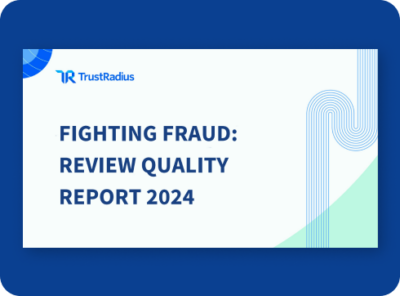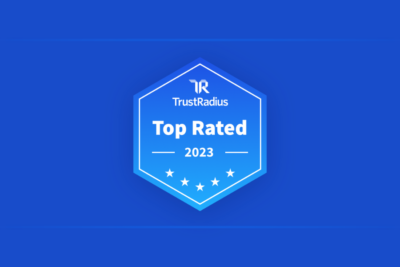
Building Trust One Review at a Time
As user reviews spread to business software, how do you know what to trust? What safeguards are business review sites taking to ensure that their content is legitimate and representative of reality? Trust and fraud prevention has been an issue for consumer review sites since inception, but the stakes for business software reviews are much higher. The consequences for a bad software decision are generally far more severe than a bad meal or hotel stay. Software is expensive to purchase and implement, you often sign long-term contracts, and it’s painful to switch. Additionally, the number of people who can review a business software product is typically far fewer than those who can review a hotel or restaurant, so each review carries more weight.
Louis Columbus, a consultant and influential writer about enterprise software, in his article Why Completely Trusting Enterprise Software Review Sites Is a Bad Idea wrote, “Enterprise software selection decisions have a direct impact on future financial performance. Choosing the right enterprise software can strengthen customer relationships and streamline production. From having been involved in many software selection projects over the last twenty years, one resoundingly clear lesson I’ve learned is: when you marry the application you marry the vendor. That’s why putting blind trust into these review sites is a bad idea. These sites need greater transparency and a more proven track record to earn and keep trust.”
Trust is not just important to buyers, it’s also critical for vendors, as they determine, where to send their prospects for reliable insights, and their customers to review them. Enterprise Social Media Management vendor Sprinklr recently wrote, “Many sites now aspire to be the credible advisor to companies about to invest millions or tens of millions in a solution. But with so many review sites to choose from, how do you know which one to trust? How do you know which provides truly unbiased, well-researched, useful reviews that will help you make the best decision for your business?” Sprinklr has decided to concentrate its review program efforts on our site. It defined five criteria based upon which they made their choice, which they articulate in their post.
How we put the “Trust” in TrustRadius
I conceived the idea for TrustRadius, an in-depth peer review site for business software, at my last company after seeing teams really struggle to find good intelligence to inform software purchase decisions. In some cases we picked the wrong product. In other cases, we went down the wrong implementation path, and in other instances, we under estimated the staffing requirements for a product. Talking to others, I realized that we were not unique. They too shared the same frustrations with finding good intelligence. In some cases the lack of information actually caused them to take no action. What ultimately pushed me to start TrustRadius was a search to buy a high-end coffee machine for my wife. I discovered a few specialist review sites and was blown away with the detailed user reviews which described in detail facets like the reliability and maintenance requirements of each appliance. I thought it was crazy that this level of insight was available for a home appliance, but not for an expensive piece of business software.
From day one, our mission has been to help professionals make smart, confident software decisions through accessing candid insights from peers in the form of product ratings, in-depth reviews, comparisons, and research reports that our research team writes based upon reviews. We picked the name “TrustRadius” very intentionally. We’re striving to become the most trusted source to help professionals make business software decisions. We do that through increasing the “radius” or network of people that software buyers can trust. We’ve worked really hard to engineer trust into our site and business model. Here are the steps we’ve taken thus far:
1. A Fair Open Directory
Historically software review sites have charged products to be listed or required an advertising or lead generation agreement to be in place, i.e. they are “pay to play”. Some display products on their site according to how many leads they sell to them. On TrustRadius, any product can be listed or reviewed free of charge. The default listing order of products in categories is based upon review count, and users can re-sort by average rating and product name.
2. Screening for Fraud & Bias
Preventing illegitimate user reviews is a challenge for all review sites. TrustRadius rejects 3-5% of submissions and employs the following screening methods:
- Every reviewer/rater is required to authenticate via their LinkedIn account and each profile and review checked by a member of our research team to assess legitimacy. The LinkedIn authentication also allows us to provide “social proof” as to the identity of the reviewer to our audience. If that person wishes to remain anonymous – which 22% of people do – you can still see their demographics and rest assured that we’ve checked their legitimacy. You can also see what other products they’ve rated and reviewed.
- We reject reviews/ratings from fake LinkedIn profiles and from vendors attempting to rate or review their own product or a competitors’. We also reject reviews from parties closely associated to a vendor e.g. development partners.
- If a consultant who primarily works with one product writes a review, we strive to ensure that the review is balanced and of real value to our community. We also describe their relationship to the product in the review summary.
3. Ensuring Representativeness
When getting a review program off the ground, it’s common for vendors to cherry pick advocates to review them. This phenomenon is amplified if using a customer advocacy platform. While these reviews are legitimate, they clearly skew positive, whereas prospective customers want to see a range of opinions representative of overall client sentiment. They also want to see a sufficient number of data points for confidence. We recommend that vendors reach beyond their core advocates and embrace transparency. Buyers are smart enough to see through ratings and reviews that are overly positive and if that’s all they see, they’ll hunt elsewhere for additional feedback. The Journal of Marketing conducted a study of book reviews and sales on Amazon.com and wrote the following:
- “While the star ratings themselves didn’t influence sales, the variability in star ratings positively influenced sales. In other words, if a visitor sees nothing but 5 star reviews, they get suspicious.”
- “Including some negative reviews to show a wider range of opinions may actually boost conversions.”
- “In short, while a plethora of negative reviews is going to sink your product, a collection of excessively happy customer reviews will have your visitors crying “Fake!”
- “This is on Amazon, a trusted brand where the default assumption is that the customer reviews are real. This skepticism can only get worse if the user reviews are on a platform they’ve never seen before.”
TrustRadius strives to ensure representativeness by soliciting reviews and ratings independently of vendors, as well as encouraging vendors to drive participation across their customer base. Each month, the 140,000 people visiting our site are encouraged to share their sentiment on the products they utilize and we reach out to thousands of product users outside our community to encourage them to share their opinions. To date, 86.4% of the reviews/ratings on our site have been sourced independently of vendors.
4. Refreshing Reviews
Software changes quickly and it’s essential to have the latest perspective. Since most business software products do not add customers at the same pace as hotels or restaurants serve guests, you cannot just rely on new customer reviews to keep insights fresh. TrustRadius enables reviewers to update their existing reviews, and engages them to drive them to do so on a regular basis.
5. In-Depth Insights
Business software selections are complex. A likelihood to recommend rating is a gage of overall sentiment, but insufficient to understand how well a software product will suit a particular use case. TrustRadius collects multiple category-specific product ratings, and asks thoughtful questions to unearth rich insights. The average review on our site is over 400 words. This approach not only leads to really useful information, but also gives information seekers more confidence in the opinions being expressed.
6. Intelligent, Transparent Analysis
The TrustRadius Research team publishes analyses called TrustMaps™ and Buyer’s Guides that are derived from user reviews and ratings as well as conversations with independent market experts and vendors. We are transparent in our methodology – the axis for our charts are clearly defined and the number of data points included presented. We also strive to be intelligent about how products are compared. For example, in many categories certain products are targeted towards large enterprises, and others towards SMBs, so we segment our analysis and use data points pertaining to customers within that segment.
In conclusion, as user reviews continue to play an increasingly important role in the business software purchasing process, buyers are well served to be discriminating and seek out trustworthy sources. Look for factors like review depth, recency, social proof about reviewers, evidence of how reviews are collected, and for intelligent analysis. By extension, vendors should move beyond trying to have a superficial presence on multiple sites and instead consolidate their efforts in venues of quality, where your sales team can proactively send buyers with confidence that they will get reliable and rich insights to help make the right decisions. Doing so will defray the need for traditional reference management programs. Yes transparency can be scary, but the reality is that negative aspects of your product and service are being discussed somewhere, either in person or in private online forums, so it’s better to know if that feedback is being shared and work to correct it through service and product improvements. You always have the chance to respond to critiques or praise through comments.
Customer experience is the new marketing, and high-quality reviews are the new megaphone to get the word out.




